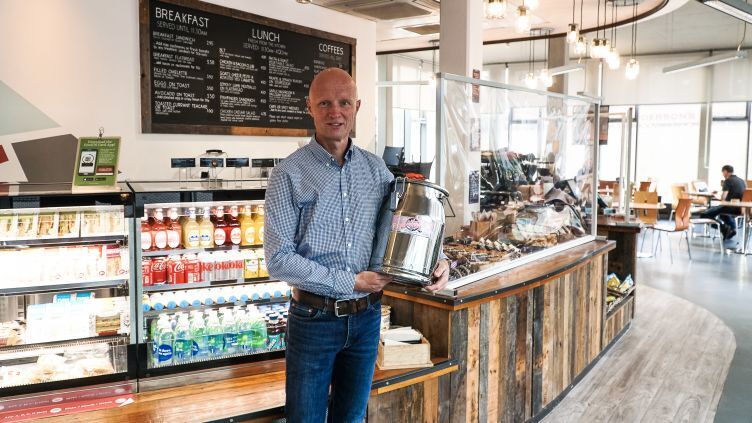
$30 trln in additional investments required to achieve net zero in 8 hard-to-abate sectors
The Net Zero Industry Tracker 2024 estimates that $30 trillion in additional capital will be required across ...

The University of Sheffield is set to significantly reduce its plastic waste by 87,000 single-use bottles per year, by switching to milk churns from a local dairy farm to supply its cafes on campus.
Over 430,000 pints of milk are used in the University’s cafes each year. Working with local dairy farm, Our Cow Molly, the University has invested in 70 stainless steel milk churns which can each hold 20 pints of milk.
The churns can be washed and refilled by Our Cow Molly, which is located just four miles from campus, helping to significantly reduce both the plastic waste and carbon emissions associated with producing new milk bottles.
The switch to churns will remove 27,000 single-use plastic bottles per year in an initial trial and a further 60,000 once rolled out across all of the University’s cafes. The innovative project will also cut the carbon footprint of milk delivery to campus by over 65 per cent – equivalent to 6.5 tons of CO2 every year.
Peter Anstess, Head of Retail at the University of Sheffield, said “With 19 cafes and bars, the retail operation at the University serves over 6,000 people every day.”
“This volume of purchasing brings a responsibility to source products that are high quality, local and sustainable. We have worked closely with Our Cow Molly for over five years which has seen the dairy become established as a key supplier across Sheffield and the milk churns are the next part of this collaboration.”
“It’s been especially encouraging to be part of such a strong collaboration with academics here at the University as together we have linked research and commerciality.”
The churns are delivered by Our Cow Molly’s local delivery teams and connected to specially-designed pumps in the University’s cafes, which dispense the milk ready to be used to make hot drinks.
The pumps have initially been installed in three of the University’s busiest cafes, which will result in a saving of 27,000 single-use plastic bottles a year. If the initial trial locations are successful, the University plans to roll out the milk pumps to the remainder of its outlets, reducing plastic waste by a further 60,000 bottles a year.
As part of its drive to source local, sustainable produce wherever possible, the University has used exclusively Our Cow Molly milk in its cafes for over five years. This means all the milk used on campus only travels around four miles and is under 24 hours old when it is served in hot drinks.
This new innovative project has been collaboration between the Our Cow Molly and a number of leading academic and professional teams at the University, including the Grantham Center for Sustainable Futures, Institute for Sustainable Food, and Accommodation and Commercial Services team.
Eddie Andrew, Director of Our Cow Molly, said: “We attended a two day plastics conference where anyone with a good plastic saving idea was invited to get up and present it. The following day I saw Peter Anstess, Head of Retail at the University, and with an old milk churn and a Tetley’s hand pull demonstrated a very agricultural first version of our idea for reusable milk churns.
“Fast forward almost two years and to see this now developed into a fully-fledged circular system is fantastic. Thanks to the support of staff throughout the University, including Professor Duncan Cameron at the Institute for Sustainable Food for funding a prototype, this new project is now saving plastic waste every day and, most importantly, proving the concept works.”
The Grantham Center for Sustainable Futures at the University of Sheffield undertook the initial research into the most sustainable way to deliver milk as part of an undergraduate research project and Higher Education Innovation Fund grant, the first to look at a bulk delivery model for milk. Previous studies considered alternatives to plastic, such as cartons, or reusable glass bottles, but these are not practical for commercial business where large volumes of milk are being used.
Dr Rachael Rothman, Co-Director of the Grantham Center for Sustainable Futures and Academic Lead for Sustainability at the University said “It is so important we work together to reduce single use packaging and this project is an excellent example of how impact can be achieved by interdisciplinary, collaborative working. It is fantastic to see the milk churns in action in University cafes, reducing the carbon footprint of the milk delivery by over 65 percent. We are continuing the research, investigating how to make the cleaning processes as efficient as possible and hope to roll out reusable churns across the city.”
Milk is only one element in the University’s aim to make the UK’s most sustainable cup of coffee. The coffee used in its cafes is from local company Roastology, which roasts its coffee beans only three miles from campus. As part of a coffee-growing cooperative called CENCOIC in the Cauca region of Colombia, Roastology can tell the University exactly which farms its coffee was grown on, and ensure a fair wage is paid to the farmers.
The University is also aiming to reduce the amount of single-use cups used on campus. From this year it will charge an additional levy of 20p on single-use disposable cups, and has introduced a new campus cup hire and reuse scheme with a company called Vytal.
The Net Zero Industry Tracker 2024 estimates that $30 trillion in additional capital will be required across ...
Egypt is gearing up for the 2025 Human Development Report, and debt swap initiatives, all ...
The European Bank for Reconstruction and Development (EBRD), the United Kingdom’s High-Impact Partnership on Climate ...


اترك تعليقا